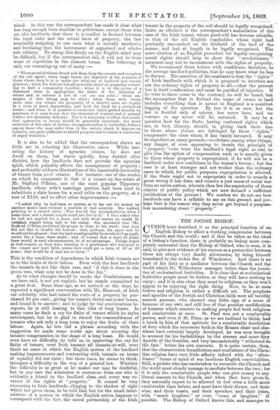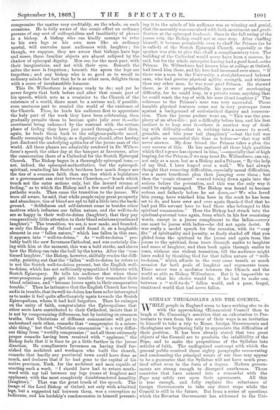THE JOCOSE BISHOP.
CYNICS have described it as the principal function of an English Bishop to effect a working compromise between, the Church and the world ; and if this be taken as the ideal of a bishop's function, there is probably no bishop more com- pletely successful than the Bishop of Oxford, who is soon, it is said, to give new evidence of his success as a protocolist between these not always very deadly adversaries, by being himself translated to the richer See of Winchester. And there is no part of his duty as a mediator between the Church and the- world which Dr. Wilberforce manages better than the jocosi- ties of ecclesiastical festivities. It is clear that at ecclesiastical festivities people must be festive, or they will have nothing to ; and it is also clear they must be religious, or they won't, appear to be enjoying the right thing. Now, to be at once- festive and religious is rather a difficult art. The prophet& and apostles of the Jewish and Christian faith were all terribly earnest persons, who showed very little sign of a sense of- humour of any start, and still less of that peculiar modification, of humour which consists in making people feel both religious. and comfortable at once. St. Paul was not a comfortable person, and even if St. Peter, as we are inclined to think, had a touch in him of that aptitude for a comfortable dereliction, of duty which his successors both in the Roman chair and else- where have certainly largely developed, he was soon brought, to account for his backslidings by the sterner and more fiery Apostle of the Gentiles, and very uncomfortably " withstood to, the face" before his own converts. It is quite certain, then, that the characteristic humiliations and exaltations of the Chris- tian religion have very little affinity indeed with the " after- dinner" frame of mind of our facetious English convivialities.. -Still, a prelate who has undertaken to reconcile the Church and the world must clearly manage to mediate between the two ; for it is only the comfortable people who can give money to any liberal amount to the Church, and when they have given it, they naturally expect to be allowed to feel even a little more comfortable than before, and must have their dinner, and their wine, and their toasts, and their speeches, and their jokes,. with "much laughter," or even "roars of laughter," if possible. The Bishop of Oxford knows this, and manages to
compromise the matter very creditably, on the whole, on such occasions. He is fully aware of the comic effect on ordinary persons of any sort of colloquialism and familiarity of phrase in a bishop. A bishop who can kindly manage to refer to his own legs or his own nose like an ordinary mortal, will convulse most audiences with laughter ; for though, we suppose, they are aware that bishops have legs and noses, those familiar objects are almost eclipsed by the shadow of episcopal dignity. Men see, for the most part, with their imaginations, and not with their eyes. Beneath the mitre the nose is forgotten ; beneath the apron the legs are forgotten ; and any bishop who is so good as to recall to ordinary minds the fact that he is as other men, delights them with a sense of inexhaustible humour.
This Dr. Wilberforce is always ready to do ; and yet he never forgets that both before and after that comic part of his speech, which acts as a reminder to the Church of the existence of a world, there must be a serious and, if possible, even unctuous part to remind the world of the existence of the Church. Thus, he leads his audience first to appreciate the holy part of the work they have been celebrating, then gradually permits them to become quite jolly over it,—the merriment being enhanced by the contrast with the serious phase of feeling they have just passed through,—and then, again, he leads them back to the religious-pathetic mood, finally resuming the bishop, as a dignitary should, after having just disclosed the underlying aptitudes of the jocose man of the world. All these phases are admirably rendered in Dr. Wilber- force's speech the other day at the banquet at Inverness, after the consecration there of a Cathedral for the Scotch Episcopal Church. The Bishop began in a thoroughly episcopal tone,— not, indeed, the episcopal-authoritative, but the episcopal- spiritual, reminding his Scotch brethren how much deeper are the ties of a common faith than any ties which a legislature or a government can rivet between Churches,—" bonds which touch not the outer actions only, but the inward stream of feeling," as to which the Bishop said a few cordial and almost pathetic words. Then came the transition to the jocose. We were all aware, he said, that while people enjoy great prosperity and abundance, ties of blood are apt to fall a little into the back- ground. " Selfishness and self-interest come in besides other motives which influence our fallen nature, and the well-to-do are so happy in their well-to-doism (laughter), that they pay comparatively little attention to their blood relations (continued laughter)." The transition, we see, is now made, and founded, as only the Bishop of Oxford could found it, on a laughable element in our " fallen nature," which has fallen in this case, it appears, into " well-to-doism." As " well-to-doism " pro- bably built the new Inverness Cathedral, and was certainly din- ing with him at the moment, this was a bold stroke, and shows how the Bishop can take the bull by the horns. After the "con- tinued laughter," the Bishop, however, skilfully evades the diffi- culty, pointing out that the "fallen" well-to-doism he refers to is not the Scotch well-to-doism present, but the English well- to-doism, which has not sufficiently sympathized hitherto with Scotch Episcopacy. He tells his audience that when these over-prosperous people get into trouble they remember their blood relations, and "become lovers again in their comparative trouble." Then he intimates that the English Church has been and is in trouble, that its well-to-doism has been so far interrupted as to make it feel quite affectionately again towards the Scotch Episcopalians, whom it had half forgotten. Then he enlarges on the unity of faith, congratulates the Episcopalians that other sects have contributed to their Cathedral, insists that it is not by compromising differences, but by insisting on common truths, that Christians of different communions will get to understand each other, remarks that " compromise is a miser- able thing," but that "Christian communion" is a very differ- ent thing from "worldly compromise ;" and all these extremely proper remarks having been received with " applause," the Bishop feels that it is time to go a little further in the jocose direction. He compliments Inverness on having itself fur- nished the architect and workmen who built the church, remarks that hardly any provincial town could have done as much, and declares that if he had gone to the capital of his native province, York, for the architect and men capable of erecting such a work, " I should have had to return south- ward with my tail between my legs (roars of laughter and applause), with the most completely dumbfoundered humility (laughter)." That was the great touch of the speech. The image of the Lord Bishop of Oxford, not only with admitted legs, but a suggested tail between them, was a, conception so ludicrous, and his lordship's condescension in himself present- ing it to the minds of his andience was so winning and genial, that the assembly was convulsed with both merriment and grati- fication at the episcopal bonhomie. Once in the full swing of the jocose vein, the Bishop could not at once stop. After chaffing himself, it became permissible even to chaff the Primus (as he is called) of the Scotch Episcopal Church, especially as the speaker was able to give this chaff a complimentary turn. The building of the Cathedral would never have been a success, he said, but for the whole enterprise having had a good head,—the Primus. Dr. Wilberforce had known him at college at Oxford, had loved him there, and his love had increased ever since. " If there was a man in the University, a straightforward beloved man, who had greater physical agility, strength, and wiriness than any other man, he was your good Primus. He showed there, as it were prophetically, his power of overleaping difficulty, for he could leap, in a private room, anything that he could reach the top of with his nose (loud laughter.)" The reference to the Primus's nose was very successful. These humble physical features come out in very grotesque force against a background of ecclesiastical dignity and consecra- tion. Then the jocose prelate went on, " This was the pro- phecy of an after-life : put a difficulty before him, and his first instinct is to leap over it—there is another way of deal- ing with difficulty—that is, retiring into a corner to scowl, grumble, and bite your tail (laughter) "—but the tail was not quite so successful this time as before—" that way will never answer. My dear friend the Primus takes a plan the very reverse of this. He has matured all those high qualities which God's grace has ripened in him,"—especially that of high leaping, for the Primus, if we may trust Dr. Wilberforce, can say, not only as a man, but as a Bishop and a Primus, " By the help of my God, I have leaped over a wall." We had always thought that removing difficulties, especially moral difficulties, was a more. beneficent plan than jumping over them ; but then the comic element ' wanted toning down again into the serious before the peroration, and this was the only way it could be easily managed. The Bishop was bound to become serious and fatherly before he sat down,—" We who loved him young, have watched him here in the work he has been set to do, and have over and over again thanked God that he had put His servant here to lead those who belonged to this spiritual communion." Here the Bishop had struck into the spiritual-paternal tone again, from which in his few remaining words, except in a jocose compliment to the ladies—every one must be jocose with ladies—he did not again desist. It was really a model speech for the occasion, with its " easy fits " of spirituality and jocosity, so finely shaded off that you glided from the spiritual to the jocose and again from the jocose to the spiritual, from tears through smiles to laughter and roars of laughter, and then back again through smiles to tears, without one violent transition, till the audience might have ended by thanking God for that fallen nature of " well- to-doism," which affords in the very same breath so much occasion for both peals of laughter and regenerate tears. There never was a mediator between the Church and the world so able as Bishop Wilberforce. But it is impossible to doubt what his choice would be, if he had to make one, between a "well-to-do " fallen world, and a poor, frugal, straitened world that had never fallen.































 Previous page
Previous page